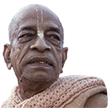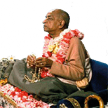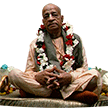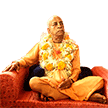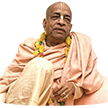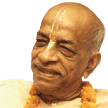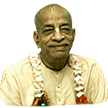Brahma-bhuta - an essential subject: Difference between revisions
Nayanranjani (talk | contribs) (Created page with "Category:Essential Subjects <!----------------------- edit below this line -----------------------> <!------------------------ begin introduction text below ------------...") |
(Vanibot #0041: Moves Choose Another box to the end) |
||
| Line 2: | Line 2: | ||
<!----------------------- edit below this line -----------------------> | <!----------------------- edit below this line -----------------------> | ||
<!------------------------ begin introduction text below ------------------------> | <!------------------------ begin introduction text below ------------------------> | ||
What does Brahma-bhuta mean? Does it mean God? Scriptures say that brahma-bhuta is to come to the light of God, meaning that one has achieved liberation from this diseased material world, and has entered into the spiritual realm. The symptoms of a person in that state are that he is detached and is therefore self-satisfied, without any hankering for sense enjoyment. However, although one may be rather close to reaching God in that state, it does not mean that he has gone back to Godhead. While attaining the brahma-bhuta state is necessary to progress in devotional service, one has to understand that once he enters the spiritual realm, he is still quite prone to falling down again. Therefore, the only guaranteed method of going back to Lord Krishna and never returning to this material world is via pure loving devotional service to the Lord since being Krishna conscious means to be constantly engaged in sustaining the spirit, allowing one to remain afloat in pure spiritual activities. | |||
Srila Prabhupada's books, lectures, conversations and letters offer a comprehensive presentation of this essential subject as seen in the Vaniquotes '''[[Vaniquotes:Category:Brahma-bhuta|Brahma-bhuta]]''' category. An introduction from his books is given below in the following | Srila Prabhupada's books, lectures, conversations and letters offer a comprehensive presentation of this essential subject as seen in the Vaniquotes '''[[Vaniquotes:Category:Brahma-bhuta|Brahma-bhuta]]''' category. An introduction from his books is given below in the following 8 quotes. | ||
<!-------- end introduction text and don't touch next three lines ---------> | <!-------- end introduction text and don't touch next three lines ---------> | ||
---- | ---- | ||
== Quotes from Srila Prabhupada's books == | == Quotes from Srila Prabhupada's books == | ||
<!----------------- edit quote boxes below this line -----------------> | <!----------------- edit quote boxes below this line -----------------> | ||
{{VaniQuotebox| | {{VaniQuotebox|As confirmed in the Bhagavad-gita, in the brahma-bhuta stage of life one becomes free from hankering and lamentation. Therefore the conclusion is that the inhabitants of the Vaikuntha planets are all brahma-bhuta living entities|The mode of ignorance influences a living entity to the habit of lust and hankering, and this means that in the Vaikuṇṭhalokas the living entities are free from these two things. As confirmed in the Bhagavad-gītā, in the brahma-bhūta (SB 4.30.20) stage of life one becomes free from hankering and lamentation. Therefore the conclusion is that the inhabitants of the Vaikuṇṭha planets are all brahma-bhūta living entities, as distinguished from the mundane creatures who are all compact in hankering and lamentation. '''(Śrīmad-Bhāgavatam 2.9.10)'''}} | ||
{{VaniQuotebox| | {{VaniQuotebox|Even though one may come to the platform of brahma-bhuta and understand his spiritual identity by speculative knowledge, one cannot enjoy spiritual life without understanding the Supreme Personality of Godhead|Even though one may come to the platform of brahma-bhūta (SB 4.30.20) and understand his spiritual identity by speculative knowledge, one cannot enjoy spiritual life without understanding the Supreme Personality of Godhead. This is indicated here by the word abhīṣṭa-siddhiḥ. One can fulfill the ultimate goal of life only by engaging in devotional service to the Lord. Then the Lord will give one proper instructions on how to go back home, back to Godhead. '''(Śrīmad-Bhāgavatam 8.24.52)'''}} | ||
{{VaniQuotebox| | {{VaniQuotebox|Lord Krsna states that the brahma-bhuta ananda-maya stage is complete only when there is an exchange of love between the Supreme and the subordinate living entities|The actual ānanda-maya (blissful) stage is attained when one is engaged in devotional service. That is confirmed in the Bhagavad-gītā: mad-bhaktiṁ labhate parām (BG 18.54). Here Lord Kṛṣṇa states that the brahma-bhūta ānanda-maya stage is complete only when there is an exchange of love between the Supreme and the subordinate living entities. Unless one comes to this ānanda-maya stage, his breathing is like the breathing of a bellows in a blacksmith's shop, his duration of life is like that of a tree, and he is no better than the lower animals like the camels, hogs and dogs. '''(Kṛṣṇa Book, Chapter 87)'''}} | ||
{{VaniQuotebox| | {{VaniQuotebox|One has to come to the brahma-bhuta stage for going back to Godhead|When the yogī reaches the ājñā-cakra, between the two eyebrows, he is able to penetrate the brahma-randhra, or the hole in his skull, and go to any planet he desires, up to the spiritual kingdom of Vaikuṇṭha, or Kṛṣṇaloka. The conclusion is that one has to come to the brahma-bhūta stage (SB 4.30.20) for going back to Godhead. However, those who are in Kṛṣṇa consciousness, or who are practicing bhakti-yoga (śravaṇaṁ kīrtanaṁ viṣṇoḥ smaraṇaṁ pāda-sevanam (SB 7.5.23)), can return to Godhead without even practicing the muktāsana process. '''(Śrīmad-Bhāgavatam 4.23.14)'''}} | ||
{{VaniQuotebox| | {{VaniQuotebox|Regardless of what we have done in our past lives, if we engage ourselves in unalloyed devotional service to the Lord in this life, we will always be situated in the brahma-bhuta - liberated state|Regardless of what we have done in our past lives, if we engage ourselves in unalloyed devotional service to the Lord in this life, we will always be situated in the brahma-bhūta (liberated) state, free from reactions, and will not be obliged to accept another material body. '''(Śrīmad-Bhāgavatam 5.1.16)'''}} | ||
{{VaniQuotebox| | {{VaniQuotebox|A living being in his normal constitutional position is fully satisfied in spiritual bliss. This state of existence is called brahma-bhuta or atmananda, or the state of self-satisfaction|A living being in his normal constitutional position is fully satisfied in spiritual bliss. This state of existence is called brahma-bhūta or ātmānanda, or the state of self-satisfaction. This self-satisfaction is not like the satisfaction of the inactive fool. The inactive fool is in the state of foolish ignorance, whereas the self-satisfied ātmānandī is transcendental to the material state of existence. This stage of perfection is attained as soon as one is fixed in irrevocable devotional service. Devotional service is not inactivity, but the unalloyed activity of the soul. '''(Śrīmad-Bhāgavatam 1.2.19)'''}} | ||
{{VaniQuotebox| | {{VaniQuotebox|To the impersonalist, achieving the brahma-bhuta stage, becoming one with the Absolute, is the last word. But for the personalist, or pure devotee, one has to go still further, to become engaged in pure devotional service|To the impersonalist, achieving the brahma-bhūta stage, becoming one with the Absolute, is the last word. But for the personalist, or pure devotee, one has to go still further, to become engaged in pure devotional service. This means that one who is engaged in pure devotional service to the Supreme Lord is already in a state of liberation, called brahma-bhūta (SB 4.30.20), oneness with the Absolute. '''(Bhagavad-gītā 18.54)'''}} | ||
{{VaniQuotebox| | {{VaniQuotebox|In the brahma-bhuta stage of life there is no anxiety and no hankering. This stage begins when one is equally disposed toward all living entities, and it then expands to the stage of Krsna consciousness|The ānanda-maya stage is explained in the Bhagavad-gītā as the brahma-bhūta (SB 4.30.20) stage. There it is said that in the brahma-bhūta stage of life there is no anxiety and no hankering. This stage begins when one is equally disposed toward all living entities, and it then expands to the stage of Kṛṣṇa consciousness, in which one always hankers to render service unto the Supreme Personality of Godhead. This hankering for advancement in devotional service is not the same as hankering for sense gratification in material existence. In other words, hankering remains in spiritual life, but it becomes purified. '''(Kṛṣṇa Book, Chapter 87)'''}} | ||
<!----------------- edit quote boxes above this line -----------------> | <!----------------- edit quote boxes above this line -----------------> | ||
| Line 31: | Line 31: | ||
'''Brahma-bhuta - [[Vaniquotes:Category:Brahma-bhuta|explore more within this category]]'''. | '''Brahma-bhuta - [[Vaniquotes:Category:Brahma-bhuta|explore more within this category]]'''. | ||
{{EsentialSubjectTotal}} | {{EsentialSubjectTotal}} | ||
<div style="float:left;"> | |||
{{EssentialSubjectnav}} | |||
</div> | |||
__NOTOC__ | __NOTOC__ | ||
__NOEDITSECTION__ | __NOEDITSECTION__ | ||
Latest revision as of 15:57, 22 November 2020
What does Brahma-bhuta mean? Does it mean God? Scriptures say that brahma-bhuta is to come to the light of God, meaning that one has achieved liberation from this diseased material world, and has entered into the spiritual realm. The symptoms of a person in that state are that he is detached and is therefore self-satisfied, without any hankering for sense enjoyment. However, although one may be rather close to reaching God in that state, it does not mean that he has gone back to Godhead. While attaining the brahma-bhuta state is necessary to progress in devotional service, one has to understand that once he enters the spiritual realm, he is still quite prone to falling down again. Therefore, the only guaranteed method of going back to Lord Krishna and never returning to this material world is via pure loving devotional service to the Lord since being Krishna conscious means to be constantly engaged in sustaining the spirit, allowing one to remain afloat in pure spiritual activities.
Srila Prabhupada's books, lectures, conversations and letters offer a comprehensive presentation of this essential subject as seen in the Vaniquotes Brahma-bhuta category. An introduction from his books is given below in the following 8 quotes.
Quotes from Srila Prabhupada's books
Brahma-bhuta - explore more within this category.
Vanipedia has now over 903 introductory articles compiled from Srila Prabhupada's books under the series titled Essential Subjects. All these articles can be seen in the Table of Content on the right side of this article and also here in this Umbrella Category. Browse through them to relish the breadth and depth of Srila Prabhupada's teachings - There is a subject for everyone.
